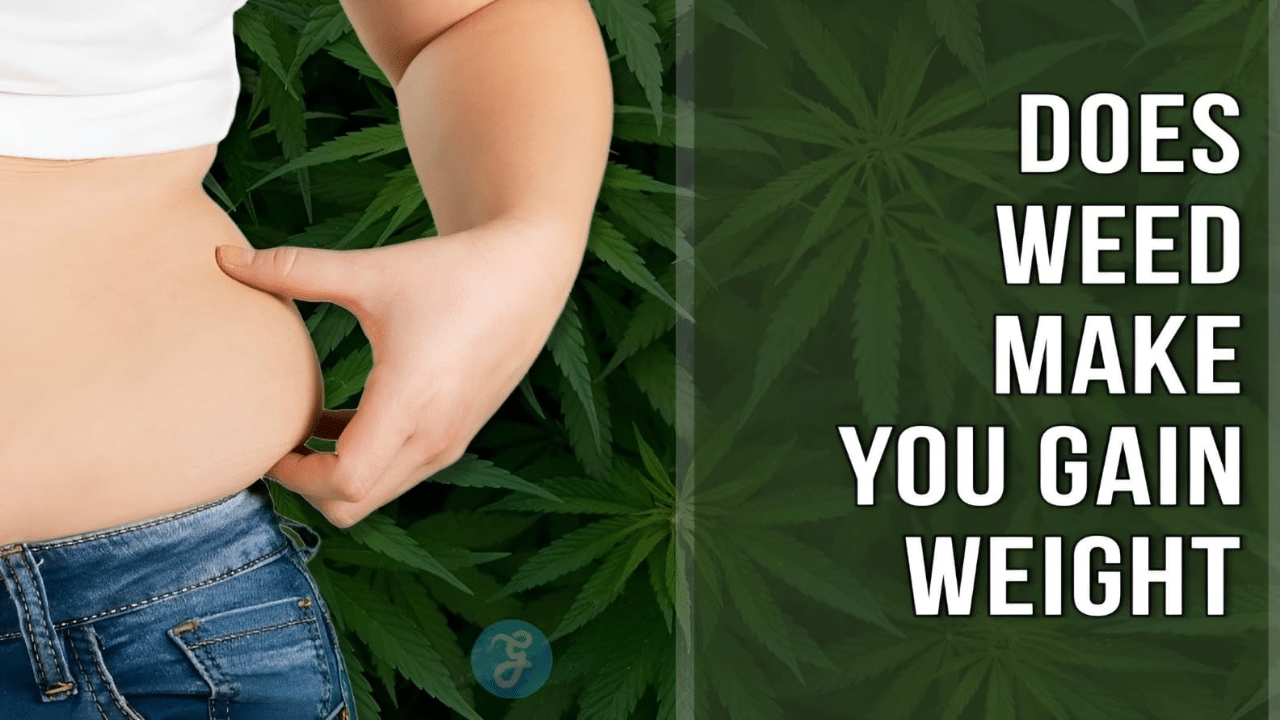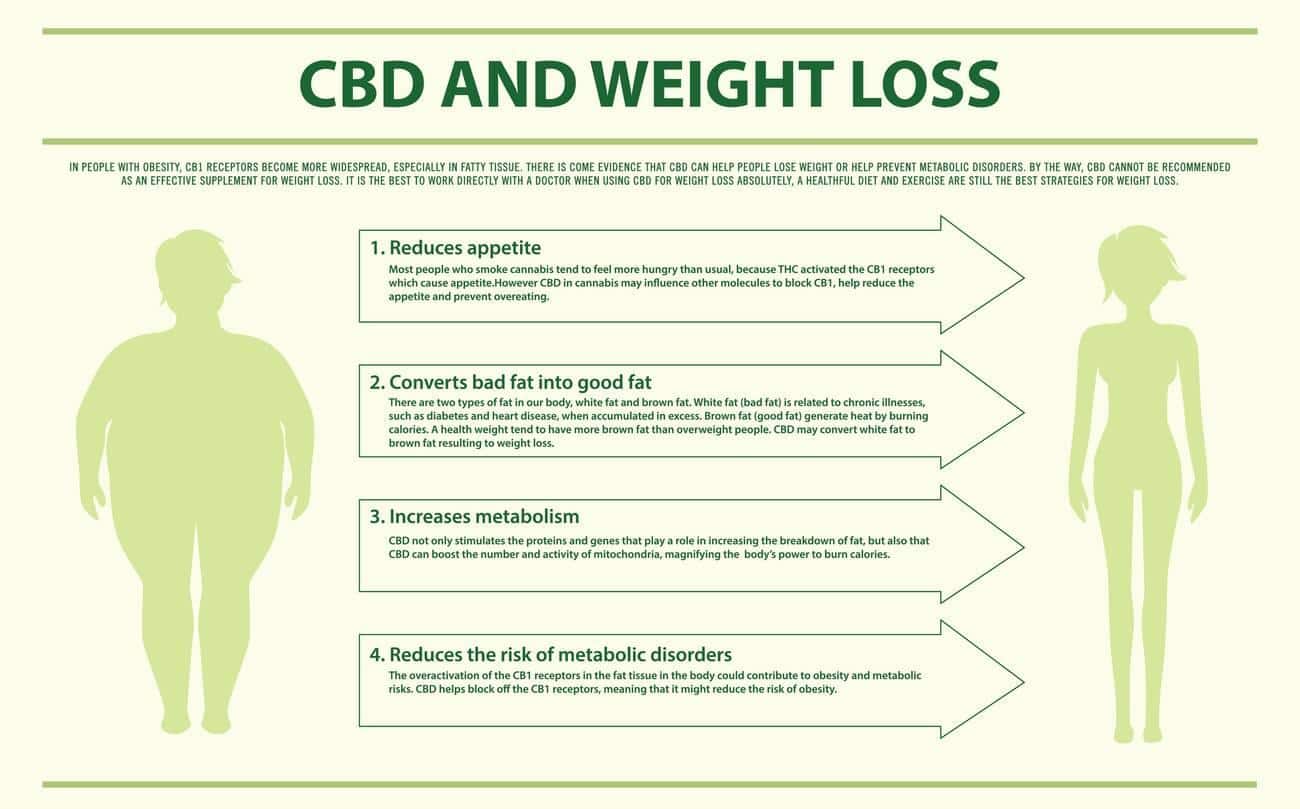Listen to the Podcast:
Much debate and discussion have been lately about the relationship between marijuana use and body weight. With nearly 2.2 thousand queries on Does weed make you gain weight or lose? So, it’s clear that public interest in this topic is growing rapidly.
Although cannabis is a controversial substance with some potential medical benefits, including appetite stimulation, current research indicates that it does not directly lead to weight gain or loss.
Key Takeaways
- The active ingredient in marijuana, THC, can increase appetite and lead to cravings for high-calorie foods. However, no concrete evidence suggests marijuana use leads to weight gain.
- Some studies have found a correlation between long-term cannabis usage and lower body mass index (BMI).
- Smoking or vaporizing weed has a negligible effect on calorie intake. Furthermore, some strains of marijuana can suppress appetite and lead to weight loss.
- Dosing, genetics, pre-existing conditions, and strain type may influence the relationship between weed use and weight. It’s essential to maintain healthy eating habits, regular exercise, and moderation in marijuana use while being mindful of one’s food choices for optimal health outcomes.
Understanding the Relationship Between Weed and Body Weight
The “Munchies” Phenomenon: THC activates the brain’s endocannabinoid system, leading to increased hunger and cravings, commonly called “munchies.”
The Controversy Surrounding Marijuana Use and Weight Gain
The controversy surrounding marijuana use and weight gain stems from the various ways cannabis affects different individuals. While it is well known that marijuana can increase appetite, often referred to as “the munchies,” some studies have shown a correlation between long-term cannabis usage and lower body mass index (BMI).
For instance, some people claim they have experienced considerable weight gain after regularly smoking weed due to increased cravings for unhealthy snacks and overeating.
On the other hand, some assert that their marijuana consumption has not impacted their body weight or even helped them shed some extra pounds by boosting metabolism and promoting exercise performance.
The Science Behind Marijuana and Appetite
One of the primary reasons marijuana has been linked to appetite stimulation is due to its active ingredient, tetrahydrocannabinol (THC). THC interacts with the endocannabinoid system, a network of receptors throughout our bodies that help regulate various physiological processes such as mood, pain sensation, immunity, and most importantly, in this context – hunger.
Moreover, research has uncovered an interesting phenomenon called “the munchies,” wherein cannabis users experience heightened senses of taste and smell when under the influence.
This intensification can make food more palatable and appealing, thus encouraging further consumption by overriding satiety signals in the body. For example, a Yale School of Medicine study found that exposure to THC increased dopamine levels within reward-related brain regions during food intake, adding evidence to support marijuana-induced increases in appetite.
THC and the Endocannabinoid System
Tetrahydrocannabinol (THC), the primary psychoactive component found in cannabis, interacts with the body’s endocannabinoid system (ECS) to produce various effects. The ECS is a complex cell-signaling network that is essential in regulating numerous physiological processes, including appetite, mood, sleep, and pain perception.
When THC enters the bloodstream, it binds primarily to CB1 receptors throughout the brain and central nervous system. This interaction stimulates appetite by activating specific neural circuits responsible for food-seeking behavior while blocking signals communicating satiety or fullness.
One notable example illustrating this relationship between THC and the ECS is what many call “the munchies,” where marijuana users report intense cravings for high-calorie foods after consuming cannabis.
The “Munchies” Phenomenon
When you use marijuana, you may experience an increase in appetite and cravings for high-calorie foods, known as “the munchies.” This phenomenon results from THC’s effect on the brain’s reward system, hormones, and endocannabinoids.
In particular, THC stimulates the release of the hormone ghrelin, which triggers hunger signals in the brain. Additionally, it activates neurons that enhance sensitivity to smell and taste, making food more appealing.
As a result, many people who use marijuana find themselves snacking more than usual or indulging in unhealthy foods.
Does Weed Make You Gain Weight?
Contrary to popular belief, no solid evidence suggests marijuana use leads to weight gain.
Lack of Evidence Supporting the Notion
Contrary to popular belief, no concrete evidence suggests that weed makes you gain weight. Several studies have found no significant correlation between cannabis use and body mass index (BMI).
While marijuana users may experience an increased appetite due to the “munchies” phenomenon caused by THC, this does not necessarily translate into weight gain.
Additionally, some strains of marijuana can suppress appetite and lead to weight loss. The relationship between weed and body weight is complex. It varies depending on individual factors such as genetics, frequency of use, dosage, pre-existing conditions, and other lifestyle choices such as diet and exercise habits.
The Relationship Between Body Mass and Marijuana Use
The relationship between body mass and marijuana use is an intriguing topic, as it defies the expectation that increased appetite, a common side effect of marijuana, would lead to weight gain. The following table presents various studies and findings related to body mass and marijuana use:
|
Study/Research |
Findings |
|
American Journal of Epidemiology (2011) |
Marijuana users had a lower prevalence of obesity compared to non-users. |
|
International Journal of Epidemiology (2015) |
Cannabis users had a lower risk of being overweight or obese than non-users. |
|
Journal of Psychopharmacology (2012) |
Marijuana users had a lower average BMI when compared to non-users. |
|
Psychosomatic Medicine (2019) |
Marijuana users had lower body fat percentage, waist circumference, and BMI than non-users. |
|
Archives of Osteoporosis (2017) |
Regular cannabis users showed no significant difference in bone mineral density compared to non-users. |
Despite the increased caloric intake often associated with marijuana use, these findings suggest that cannabis consumption does not necessarily lead to weight gain or higher body mass. Further research is needed to fully understand the complex relationship between marijuana use and body weight and the potential confounders and underlying mechanisms involved.
Impact of Long-Term Marijuana Use on Weight
Long-term marijuana use may have different effects on weight gain depending on the gender of the user. A study found that men who used cannabis for an extended period had a higher body mass index (BMI) than non-users. At the same time, there was no significant difference in BMI among women users and non-users.
Additionally, some experts believe that long-term cannabis use can lead to decreased physical activity and productivity, which could contribute to weight gain indirectly.
Does Smoking Weed Make You Lose Weight?
Smoking weed may have the potential to aid in weight loss due to its ability to increase metabolism and potentially impact exercise habits.
The Potential Impact of Marijuana Use on Weight Loss
Research suggests that marijuana can potentially help with weight loss, but it’s not a magic pill. THC has been shown to increase metabolism, which could lead to burning more calories, and some studies have linked cannabis use to lower body weight and BMI.
However, this effect may only be present in chronic users or those who consume high levels of THC. Additionally, smoking weed alone is unlikely to produce noticeable weight loss results – it must be combined with a balanced diet and regular exercise routine for maximum benefit.
The Role of Marijuana in Increasing Metabolism
THC, the active ingredient in marijuana, has been linked to increased metabolism. Scientific studies have shown that THC binds with the cannabinoid receptors found throughout the body’s endocannabinoid system, which regulates numerous physiological functions, including appetite and metabolism.
When THC activates these receptors, it increases energy expenditure and leads to a higher metabolic rate. This means that even though consuming marijuana can increase appetite, it may also result in weight loss due to a boost in metabolism.
The Potential Impact of Marijuana on Exercise
Research has suggested that smoking marijuana before exercise could improve performance. The active compounds in marijuana, like THC and CBD, are known for their anti-inflammatory properties, which may reduce muscle soreness and inflammation post-workout.
It’s important to note, however, that excessive use of marijuana can lead to decreased lung capacity and compromised cardiovascular health.
As with any drug or supplement, moderation is key when incorporating it into an exercise routine.
Factors that May Influence the Relationship Between Weed and Weight
Dosage and frequency of use, genetics, and pre-existing conditions, as well as marijuana strains, may all play a role in the complex relationship between weed and weight.
Dosage and Frequency of Use
The relationship between marijuana use and weight gain is often complex, and individual factors such as dosage and frequency of use can play a significant role. High doses of THC, the primary psychoactive ingredient in marijuana, may increase appetite and lead to overeating.
Conversely, lower doses may have little impact on food intake. Similarly, frequent use of cannabis can result in tolerance buildup that reduces its effects on appetite and metabolism. It’s important to balance enjoying the benefits of weed while maintaining healthy habits like regular exercise and mindful eating.
Genetics and Pre-existing Conditions
The relationship between weed and weight gain is complex and can be influenced by genetics and pre-existing conditions. Some people may be more prone to weight gain due to genetic factors, while others may have underlying health issues that could affect their metabolism or appetite.
It is important for individuals who use marijuana and are concerned about weight gain to consider their personal circumstances before making any changes to their lifestyle choices or usage patterns.
Talking with a healthcare professional can help identify potential risk factors and develop strategies for managing them effectively.
Marijuana Strains and Weight Gain
Different strains of marijuana can have varying effects on one’s appetite and weight. Some high-THC strains, known for their “munchies” inducing effects, may increase the levels of ghrelin – the hormone responsible for stimulating hunger – leading to weight gain.
On the other hand, some CBD-dominant strains have been studied for their potential to suppress appetite and aid in weight loss. It is essential to consider individual tolerance and dosage when selecting a strain if maintaining a healthy weight is a concern.
The Impact of Edibles on Body Weight

Eating marijuana-infused edibles can potentially lead to weight gain due to the high calorie and sugar content, but this can be managed by mindful dosing and healthy eating habits – read on for more tips!
The Potential for Edibles to Induce Weight Gain
Edibles can be a tempting way to consume marijuana, but they do come with some potential risks. One of those risks is the potential for weight gain. Because edibles are often high in sugar and fat content, consuming large quantities of them on a regular basis can lead to an increase in weight over time.
In addition, edibles have a longer-lasting effect than smoking marijuana, meaning that the “munchies” may last longer as well.
The Impact of Dosing and Potency
Proper dosing and potency are crucial when it comes to using marijuana for weight management. Consuming too high a dosage of THC, the active ingredient in cannabis, can lead to potential side effects such as anxiety or paranoia.
In addition, consuming edibles with a higher concentration of THC can also lead to overconsumption and possible weight gain. It’s important to pay attention to the potency of products before consuming them, especially if you’re looking to use cannabis for its metabolism-boosting properties. If you’re interested, then learn about the countries where marijuana is legal.
Strategies for Maintaining a Healthy Weight While Using Marijuana
Maintaining a healthy weight while using marijuana can be achieved through practicing healthy eating habits, engaging in regular exercise, moderating marijuana use, practicing mindful eating, and maintaining a balanced diet.
Healthy Eating Habits
Maintaining a healthy diet is crucial for staying at a healthy weight, even when using marijuana. Here are some tips for adopting healthy eating habits:
- Focus on nutrient-dense foods, such as fruits, vegetables, whole grains, and lean protein sources like chicken and fish.
- Avoid processed and high-calorie foods that are low in nutrients.
- Be mindful of portion sizes to ensure you’re not overeating.
- Plan ahead and prepare meals or snacks in advance to avoid making unhealthy choices when hungry.
- Stay hydrated by drinking plenty of water throughout the day.
Research suggests that marijuana use may impact appetite and metabolism, but it’s important to prioritize a balanced and nutritious diet to maintain a healthy weight while using cannabis. By adopting healthy eating habits, individuals can ensure they are fueling their bodies with the necessary nutrients while also enjoying the benefits of marijuana use.
Regular Exercise
Regular exercise is essential to maintaining a healthy weight while using marijuana. Daily physical activity can help burn calories, boost metabolism, and maintain muscle mass.
It’s recommended that adults get at least 150 minutes of moderate-intensity aerobic exercise or 75 minutes of vigorous-intensity aerobic exercise per week.
Combining regular exercise with mindful eating habits can also effectively manage your weight while using marijuana. For instance, eating a balanced diet that includes plenty of fruits and vegetables and limiting the intake of processed foods high in sugar or fat is crucial to achieving proper weight maintenance.
Additionally, choosing activities you enjoy when incorporating physical activity into your routine is important to keep motivated long-term.
Moderation In Marijuana Use
Using marijuana in moderation is crucial to maintaining a healthy weight.
To avoid these negative consequences of frequent use, users should consume marijuana in moderation and practice mindful eating. This entails being aware of what you’re eating and why you’re reaching for certain foods.
Additionally, incorporating daily physical activity into your life can help counteract any potential weight gain from cannabis use.
Mindful Eating
Maintaining a balanced and healthy diet is important, even if you’re using marijuana. Mindful eating can be an effective strategy for avoiding munchies and preventing unwanted weight gain while using cannabis.
Mindful eating involves paying attention to hunger cues, focusing on sensory experiences when eating, and being present at the moment while consuming food.
For example, try incorporating healthier options such as fruits or vegetables into your diet instead of mindlessly snacking on junk food. Eating slowly and savoring each bite is also helpful rather than quickly devouring your food.
Additionally, planning ahead by having nutritious snacks readily available can prevent impulse decisions that may lead to overeating.
Balanced Diet
Maintaining a balanced diet is crucial when managing your weight, especially while using marijuana. This means incorporating nutrient-dense whole foods into your meals and minimizing highly processed snacks like chips or candy.
Additionally, paying attention to portion sizes can help prevent overeating during those moments of intense munchies.
However, it’s worth noting that restrictive diets or extreme calorie counting may not be the best approach for everyone. Some individuals succeed with intuitive eating – focusing on listening to their body’s hunger cues and eating when they are starving rather than following strict meal plans.
Myths and Misconceptions Surrounding Weed and Weight Gain
Many people believe that smoking weed will make them gain weight, but there is actually no evidence to support this myth.
Debunking Common Myths and Misconceptions
Many myths and misconceptions surround the relationship between weed use and weight gain. Here are some common ones:
1. Myth: Weed makes you gain weight because it causes munchies.
While some people may experience an increase in appetite after using marijuana, it does not necessarily lead to overeating or weight gain. Studies have shown that regular cannabis users do not have higher body mass indices than non-users.
2. Myth: Smoking weed can help you lose weight because it speeds up your metabolism.
While some research suggests that THC may temporarily increase metabolism, no evidence smoking weed leads to long-term weight loss. In fact, some studies have found a slight increase in body fat among regular cannabis users.
3. Myth: If you stop smoking weed, you’ll automatically lose weight.
Weight loss depends on various factors, including diet and exercise habits. Quitting weed alone is unlikely to lead to significant weight loss.
4. Myth: All strains of marijuana cause weight gain.
The effect of marijuana on appetite varies depending on the strain and individual user. Some strains may actually suppress appetite, while others may increase it.
5. Myth: Marijuana is not addictive, so it can’t be harmful to your health.
Approximately one in 11 cannabis users become dependent on the drug, which can lead to adverse health consequences such as decreased motivation and cognitive impairment.
By understanding the facts about marijuana use and weight, we can better make informed decisions about our health and wellness.
Clarifying Misunderstandings: Marijuana Use and Weight
There are many misconceptions about the relationship between marijuana use and weight. One common myth is that smoking weed inevitably leads to overeating and weight gain.
However, evidence suggests that marijuana users actually have lower BMIs compared to non-users. This may be due in part to the impact of THC on metabolism.
Another common misunderstanding is that quitting marijuana leads to automatic weight gain. While some individuals may experience an increase in appetite after quitting, this does not always translate into significant weight gain if they maintain healthy eating habits and lifestyle choices such as regular exercise.
Legalization, Stigma, and Discrimination
Legalization and regulation of marijuana are essential in ending stigma and discrimination against users.
Legalization and Regulation
The legalization and regulation of marijuana have been debated for years, with varying opinions on its impact on public health and safety. Proponents argue that legalization can reduce crime rates associated with illegal drug trafficking, while opponents worry about an increase in use among youth populations.
The regulation also allows for implementing quality control measures, ensuring consumers receive safe products free from harmful contaminants. As more states continue to legalize marijuana use for both medicinal and recreational purposes, the conversation around legislation and its effects will continue to evolve.
Stigma and Discrimination Against Marijuana Users
Although marijuana use is becoming increasingly accepted and legalized in many areas, a stigma still exists surrounding its usage. This stigma can lead to discrimination against individuals who use marijuana for medicinal or recreational purposes.
Law enforcement may disproportionately target these individuals, and employers may discriminate against them in hiring or workplace policies. The perception of cannabis as a stigmatized substance has deep roots across cultures, which can make it difficult for those who rely on the plant for health reasons or enjoy using it responsibly to feel fully accepted by society.
Frequently Asked Questions (FAQs)
It’s time to familiarize yourself with some commonly asked questions on whether weed makes you gain weight.
Does smoking weed cause weight gain?
While there is evidence that marijuana use can increase appetite and lead to overeating, it is not a direct cause of weight gain on its own. In fact, some studies suggest that regular cannabis users may have lower BMI scores than non-users.
Can using CBD oil make you gain weight?
CBD oil does not contain the psychoactive component THC like marijuana does, so it should not cause significant changes in appetite or metabolism that lead to weight gain.
How can I prevent gaining weight from using weed?
To avoid potential unwanted side effects of increased hunger from consuming cannabis, try incorporating exercise into your routine and focusing on healthy eating habits such as choosing nutrient-dense foods and practicing portion control.
Are there any strains of marijuana that are less likely to cause weight gain?
Some Indica strains are known for producing more sedative effects, which can potentially result in reduced activity levels, but ultimately – the strain used will unlikely be the sole determining factor impacting health & wellness outcomes tied to overall body composition although genetic profiles (i.e., differences between individuals’ DNA) could impact how people respond when consuming various types).
Final Words
So, that was everything on – Does weed make you gain weight? In conclusion, the relationship between weed and body weight is complex and still being explored. While THC may increase appetite, there is no evidence that marijuana directly causes weight gain.
Smoking or vaporizing weed has a negligible effect on calorie intake. Dosing, genetics, pre-existing conditions, and strain type may influence the relationship between weed use and weight.
However, maintaining healthy eating habits, regular exercise, moderation in marijuana use, and mindful eating can help maintain a healthy weight while using cannabis.
It’s important to debunk myths and misconceptions surrounding marijuana use and weight gain while advocating for legalization and regulation to combat stigma against users.
Disclaimer: This content is for informational purposes only and does not replace professional medical advice, diagnosis, or treatment. This information is not comprehensive and should not be used to make health or well-being decisions. Consult a qualified healthcare professional with questions about a medical condition, treatment options, or health regimen. This website or the content should never replace professional medical advice.











































